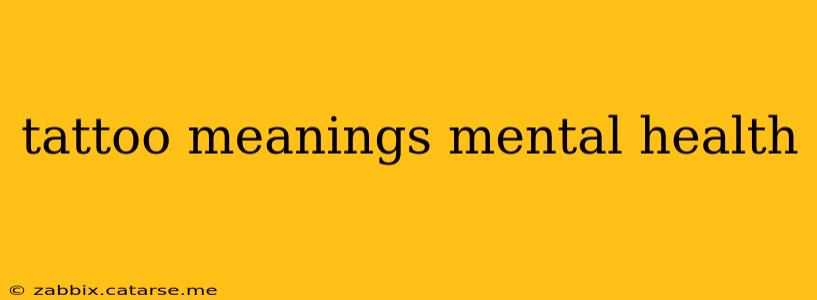Tattoos have evolved from rebellious acts of self-expression to intricate works of art carrying profound personal meaning. For many, a tattoo is more than just ink; it's a visual representation of their inner world, a testament to their journey, and a powerful tool for navigating mental health. This article delves into the significant connection between tattoo meanings and mental health, exploring the diverse ways ink can be used to process emotions, commemorate experiences, and foster self-acceptance.
Why Do People Get Tattoos Related to Mental Health?
The reasons behind choosing a mental health-related tattoo are as varied as the individuals who get them. For some, it's a form of self-care, a tangible expression of their struggles and triumphs. Others use tattoos as a reminder of resilience and a symbol of their ongoing journey towards healing. The act of getting a tattoo itself can be therapeutic, providing a sense of control and agency over one's body and narrative.
Many find solace in the shared experience that tattoos can represent. Seeing others with similar ink creates a sense of community and belonging, combating the isolating feelings often associated with mental health challenges. It's a silent way of saying, "I understand," and offering support without uttering a single word.
What are Some Common Tattoo Designs Related to Mental Health?
The diversity of tattoo designs reflecting mental health is vast, ranging from subtle and minimalist to bold and vibrant. Some popular choices include:
- Semicolons: These represent the powerful message of continuing one's story, a potent symbol of hope and perseverance in the face of adversity.
- Flowers: Often symbolizing growth, resilience, and beauty even amidst challenges. Specific flowers can carry additional meaning, such as lotus flowers representing overcoming adversity.
- Geometric shapes: Clean lines and intricate patterns can offer a sense of order and structure, particularly helpful for individuals managing anxiety or chaos.
- Animals: Animals can embody specific traits that resonate with the wearer's journey, such as a phoenix representing rebirth and renewal, or a wolf representing strength and loyalty.
- Inspirational quotes or phrases: Carefully chosen words can serve as powerful mantras and reminders of strength and self-compassion.
What are the Benefits of Getting a Mental Health-Related Tattoo?
Beyond the aesthetic appeal, mental health-related tattoos offer several potential benefits:
- Increased self-awareness: The process of selecting a design and reflecting on its meaning can foster introspection and self-understanding.
- Improved self-esteem: Taking control of one's body and expressing one's inner world can contribute to feelings of empowerment and self-acceptance.
- Enhanced coping mechanisms: The visual reminder of strength and resilience can provide comfort and support during challenging times.
- Community building: Connecting with others who share similar experiences can foster a sense of belonging and reduce feelings of isolation.
Are There Any Downsides to Getting a Mental Health-Related Tattoo?
While tattoos can be empowering, it's crucial to consider potential downsides:
- Regret: It's important to carefully consider the design and its meaning to avoid future regret, especially given the permanence of tattoos.
- Stigma: While societal attitudes towards mental health are changing, some individuals may still experience negative judgment based on their tattoos.
- Cost: Getting a quality tattoo can be expensive, and this cost should be considered before proceeding.
- Pain: The process can be painful, and individuals should assess their pain tolerance before getting inked.
How Can I Choose the Right Tattoo Design for My Mental Health Journey?
Choosing the right tattoo design is a deeply personal process. Consider:
- Your personal experience: What symbol best represents your journey, your struggles, and your triumphs?
- Your artistic style: What aesthetic appeals to you? Do you prefer minimalist designs or bold statements?
- The message you want to convey: What do you want your tattoo to communicate to yourself and to others?
- Placement: Think carefully about the placement of your tattoo and its visibility.
What if I Want to Remove a Mental Health-Related Tattoo Later?
Tattoo removal is a possibility, though it's a lengthy and often expensive process. Before getting a tattoo, consider the permanence of the decision and whether you're comfortable with the possibility of removal in the future.
Conclusion: Tattoos as a Form of Self-Expression and Healing
Tattoos can be powerful tools for self-expression, healing, and community building. For many struggling with mental health challenges, a tattoo can be a tangible symbol of their journey, a reminder of their resilience, and a testament to their ongoing fight for wellness. By thoughtfully choosing a design that resonates deeply with their experiences, individuals can harness the power of ink to foster self-acceptance, enhance coping mechanisms, and connect with a supportive community. Remember to always approach the decision responsibly and with the help of professionals if needed.
